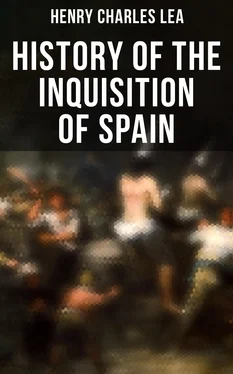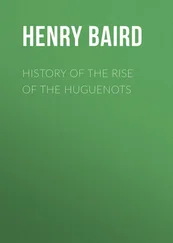EFFORTS AT CONVERSION
The Mudéjares were guaranteed the enjoyment of their own religion and laws. They had their mosques and schools and, in the earlier times, magistrates of their own race who decided all questions between themselves according to their own zunna or law, but suits between Christian and Moor were sometimes heard by a Christian judge and sometimes by a mixed bench of both faiths.[187] In the capitulations it was generally provided that they should be subject only to the taxes exacted by their previous sovereigns, though in time this was apt to be disregarded.[188] A privilege granted, in 1254, by Alfonso X to the inhabitants of Seville, authorizing them to purchase land of Moors throughout their district, shows that the paternal possessions of the latter had been undisturbed; they were free to buy and sell real estate, and although, when the reactionary period commenced, toward the close of the thirteenth century, Sancho IV granted the petition of the Córtes of Valladolid in 1293, forbidding Jews and Moors to purchase land of Christians, the restriction soon became obsolete.[189] Not only was there no prohibition of their bearing arms, but they were liable to military service. Exemption from this was a special privilege accorded, in 1115, at the capitulation of Tudela; in 1263 Jaime I of Aragon released the Moors of Masones from tribute and military service in consideration of an annual payment of 1500 sueldos jaquenses ; in 1283 his son Pedro III, when preparing to resist the invasion of Philippe le Hardi, summoned his faithful Moors of Valencia to join his armies and, in the levies made in Murcia in 1385 for the war with Portugal, each aljama had its assigned quota.[190]
DENATIONALIZATION OF THE MUDÉJARES
A wise policy would have dictated the mingling of the races as much as possible, so as to encourage unification and facilitate the efforts at conversion which were never lost to sight. The converso or baptized Moor or Jew was the special favorite of the legislator. The Moorish law which disinherited an apostate was set aside and he was assured of his share in the paternal estate; the popular tendency to stigmatize him as a tornadizo or renegat was severely repressed. The Church insisted that a Moorish captive who sincerely sought baptism should be set free. Dominicans and Franciscans were empowered to enter all places where Jews and Moors dwelt, to assemble them to listen to sermons, while the royal officials were directed to compel the attendance of those who would not come voluntarily.[191] It is easy now to see that this policy, which resulted in winning over multitudes to the faith, would have been vastly more fruitful if the races had been compelled to associate together, and infinite subsequent misery and misfortune would have been averted, but this was a stretch of tolerant humanity virtually impossible at the time. The Church, as will be seen, exerted every effort to keep them apart, on the humiliating pretext that she would lose more souls than she would gain, and there was, moreover, sufficient mutual distrust to render separation desired on both sides. At a very early period of the Reconquest the policy was adopted of assigning a special quarter of a captured town to the Moors, and thus the habit was established of providing a Morería in the larger cities, to which the Mudéjares were confined. The process is well illustrated by what occurred at Murcia, when, in 1266, it was definitely reconquered for Alfonso X by Jaime I of Aragon. He gave half the houses to Aragonese and Catalans and restricted the Moors to the quarter of the Arrijaca. Alfonso confirmed the arrangement, dislodging the Christians from among the Moors and building a wall between them. His decree on the subject recites that this was done at the prayer of the Moors, who were despoiled and ill-treated by the Christians, and who desired the protection of a wall, to the construction of which he devoted one-half of the revenues levied for the repair of the city walls. It was the same with the Jews, who were not to dwell among the Christians, but to have their Judería set apart for them near the Orihuela gate.[192] Besides this segregation from the Christians in the cities there were smaller towns in which the population was purely Moorish, where Christians were not allowed to dwell. That this was regarded as a privilege we can readily imagine, and it is shown by the confirmation, in 1255, by Alfonso X of an agreement with the Mudéjares of Moron under which they are to sell their properties to Christians and remove to Silebar, where they are to build a castle and houses, to be free of all taxes for three years, their law is to be administered by their own alcadí and no Christian is to reside there except the almojarife , or tax-gatherer, and his men.[193] All this tended to perpetuate the separation between the Christian and the Moor, and a further potent cause is to be found in the horror with which miscegenation was regarded—at least when the male offender was a Moor. Intermarriage, of course, was impossible between those of different faiths and illicit connections were punished in the most savage manner.[194]
In spite of this natural but impolitic segregation, the Mudéjares gradually became denationalized and assimilated themselves in many ways to the population by which they were surrounded. In time they forgot their native language and it became necessary for their learned men to compile law-books in Castilian for the guidance of their alcadís. Quite a literature of this kind arose and, even after the final expulsion, as late as the middle of the seventeenth century, among the refugees in Tunis, a manual of religious observances was composed in Spanish, the author of which lamented that even the sacred characters in which the Korán was written were almost unknown and that the rites of worship were forgotten or mingled with usages and customs borrowed from the Christians.[195] The Mudéjares even sympathized with the patriotic aspirations of their Castilian neighbors, as against their independent brethren. When, in 1340, Alfonso XI returned in triumph to Seville, after the overwhelming victory of the Rio Salado, we are told how the Moors and their women united with the Jews in the rejoicings which greeted the conqueror.[196] Even more practical was the response to the appeal of the Infante Fernando, in 1410, when he was besieging Antequera, one of the bulwarks of Granada, and was in great straits for money. He wrote “muy afectuosamente” to Seville and Córdova, not only to the Christians but to the Moorish and Jewish aljamas and, as he was popular with them, they advanced him what sums they could.[197] The process of denationalization and fusion with the Christian community was necessarily slow, but its progress gave gratifying promise of a result, requiring only wise patience and sympathy, which would have averted incalculable misfortunes.
THE MUDÉJARES
In a financial and industrial point of view the Mudéjares formed a most valuable portion of the population. The revenues derived from them were among the most reliable resources of the State; assignments on them were frequently used as the safest and most convenient form of securing appanages and dowries and incomes for prelates and religious establishments.[198] To the nobles on whose lands they were settled they were almost indispensable, for they were skilful agriculturists and the results of their indefatigable labors brought returns which could be realized in no other way. That they should be relentlessly exploited was a matter of course. A fuero granted, in 1371, by the Almirante Ambrosio de Bocanegra to his Mudéjares of Palma del Rio, not only specifies their dues and taxes, but prescribes that they shall bake in the seignorial oven and bathe in the seignorial bath and purchase their necessaries in the seignorial shops.[199] They were not only admirable husbandmen and artificers, but distinguished themselves in the higher regions of science and art. As physicians they ranked with the Jews, and when, in 1345, Ferrant Rodríguez, Prior of the Order of Santiago, built the Church of Our Lady of Uclés, he assembled “Moorish masters” and good Christian stone-masons, who constructed it of stone and mortar.[200] The industry of Spain was to a great extent in their hands. To them the land owed the introduction of the sugar-cane, cotton, silk, the fig, the orange and the almond. Their system of irrigation, still maintained to the present time, was elaborately perfect, and they had built highways and canals to facilitate intercourse and transportation. Valencia, which was densely populated by Mudéjares, was regarded as one of the richest provinces in Europe, producing largely of sugar, oil and wine. In manufacturing skill they were no less distinguished. Their fabrics of silk and cotton and linen and wool were exquisite; their potteries and porcelains were models for the workmen of the rest of Europe; their leather-work was unsurpassed; their manufactures of metals were eagerly sought in distant lands, while their architecture manifests their delicate skill and artistic taste. Marriages were arranged for girls at 11 and boys at 12; dowries were of little account, for a bed and a few coins were deemed sufficient where all were industrious and self-supporting, and their rapid increase, like evil weeds, was a subject of complaint to their Castilian detractors. Ingenious and laborious, sober and thrifty, a dense population found livelihood in innumerable trades, in which men, women and children all labored, producing wealth for themselves and prosperity for the land. In commerce they were equally successful; they were slaves to their word, their reputation for probity and honor was universal, and their standing as merchants was proverbial. There was no beggary among them and quarrels were rare, differences being for the most part amicably settled without recourse to their judges.[201]
Читать дальше












